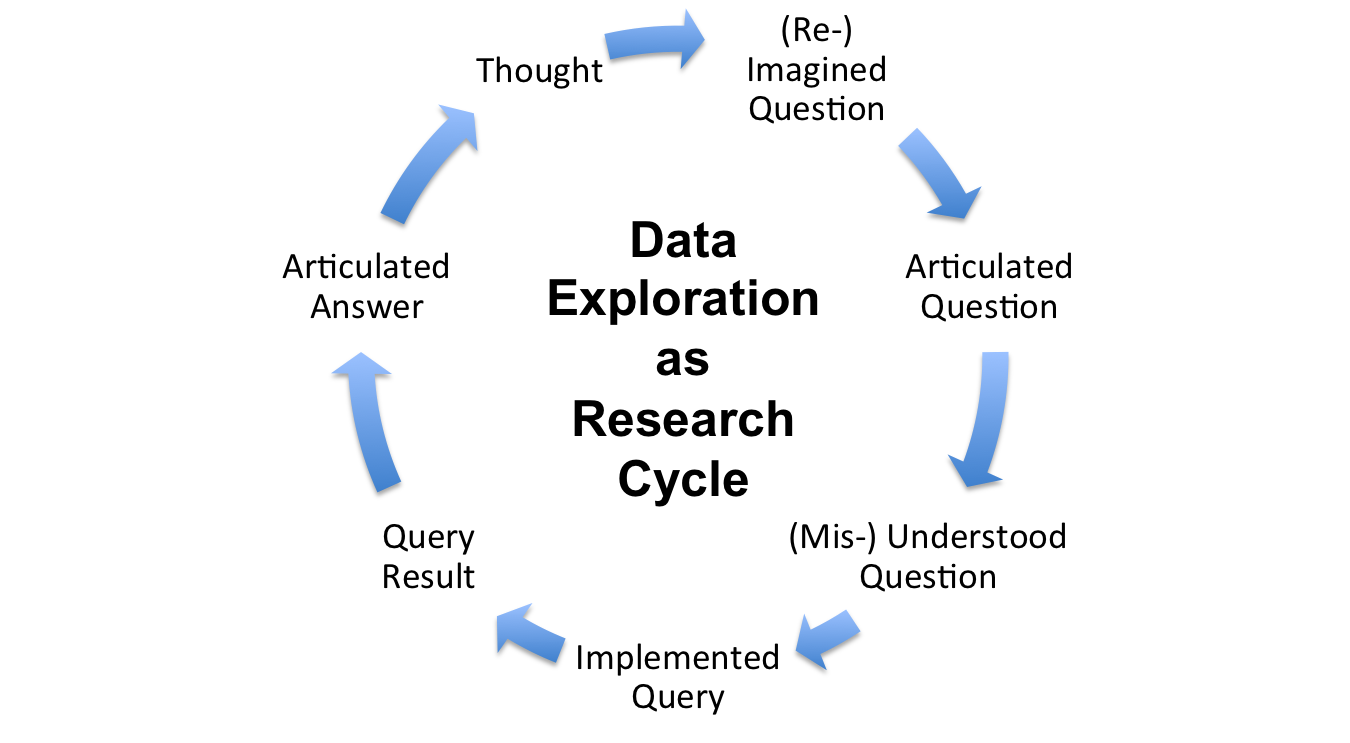Event Data Exploration is a Process Rather Than a Singular Step
By Scuba Educators
Data exploration is a process rather than a singular step. We can liken it to how we spend hours browsing the web. Why does reading one page lead to reading another? Is it to pique our interest in a new area, or to validate our existing ideas? Similar to web browsing, during data exploration, the first question’s answer sparks new questions. Discovered insights tend to relate not to the first question, but to knowledge gained on the path of exploration.
The time it takes to complete a single research cycle introduces a delay (latency) to the discovery process, stifling creativity. Scuba Analytics minimizes that delay and significantly transforms the discovery experience and effectiveness.

The research cycle
In the above figure, thought is the comparison of real-world data against the expectations generated by our mental model. Discrepancies between expectation and data generate questions. Some person or system translates those questions into a query--computation accessing data. The resulting answers match our mental model in some aspects or dimensions, but not in others. Hence, a new question arises and the cycle repeats.
Creativity and latency
In order to bring creativity to the exploration process, the Research Cycle latency must be minimal. For example, some product managers bring their questions to data scientists, who code them into queries, delivering answers the next day. Or, it could take a week. Can you imagine your web browsing clicks taking minutes or hours or days? We want it to take seconds, even for extreme volumes of data, and hard questions. When answers are provided in seconds, the thought process is uninterrupted so as not to hinder creative thinking.
The right question
Using Scuba transforms the use case from getting a singular answer into a data exploration process. Similar transformations happen when using an Internet search engine versus a librarian, or using travel websites versus travel agents. By no means does this decrease the importance of highly skilled specialists--their use cases remain (e.g. multi-leg trips, or last-minute changes). But the fast iterative data exploration cycle is best when searching not just for the answer, but for the right question (e.g. exploring places to vacation in addition to which flights to take).
Superpowers
At Scuba, our visual interface has the goal of skipping steps in the Research Cycle process. Seeing data and drilling down visually with intuitive controls, offers a faster and clearer conceptual grasp of data without intermediate steps. Inquisitive, analytical thinking is the only required skill. The process of data exploration becomes effortless and delightful, taking you where you have not explored before.
Blog Categories
Recent Blog Posts
- Crack the Code: How To Maximize Ad Revenue in a Privacy-First World
- MTCDPA: Will Montana’s New Privacy Measure Disrupt the Future of Advertising, and Business?
- Capture Signal Loss with Decision Intelligence
- AWNY24 Session Recap: Privacy Hijacks Signals: Future-Proof 1P Data with Real-Time Data Collaboration
- #PROGIONY: Game-Changers, Fading Fads, and the Future of Advertising
- Publishers’ Responsibilities in the Age of Signal Loss
Popular Blog Posts
- Diving Deeper into Analytics: How SCUBA Fills the Gaps Left by GA4
- 48 Analytics Quotes from the Experts
- 10 Great Examples of Hyper-Personalization in Entertainment & Media
- Data Bias: Why It Matters, and How to Avoid It
- It's Time to Stop Being “Data-Driven” (And Start Being Data-Informed)
- 3 Examples of Excellent Customer Experience Strategies



